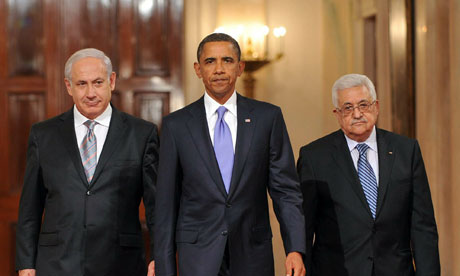
The Israeli government did not renew the ten-month settlement freeze that ended on Sunday, so settlement construction restarted. No surprise. Netanyahu would have displayed courage and conviction by renewing the freeze, given his hawkish history and (mostly) ultra-nationalist coalition. Indeed, his coalition could have crumbled, which would not necessarily have been a bad thing. It’s hard to foresee a peace deal coming from a government that includes Yisrael Beiteinu’s Avigdor Lieberman, who believes that peace talks should be based on a “population swap” and not on land-for-peace. Another significant coalition member is Shas, whose spiritual leader Ovadia Yosef recently asked God to “send a plague to” Palestinian Authority President Mahmoud Abbas (and the Palestinian people). Netanyahu has hardly stood up to these members of the Knesset, and instead has acquiesced to their demands by allowing settlement construction to resume. No surprise.
Abbas had threatened to quit the current US-guided peace talks if Netanyahu let the freeze expire. And then Netanyahu let the freeze expire, and Abbas didn’t quit the peace talks. No surprise. Abbas’ freeze-or-I’m-out threat was understandable given Palestinian public skepticism concerning the talks. Nonetheless, Abbas knows that these peace talks are the Palestinians’ best chance at establishing a viable, independent state in the near future. Israel has failed thus far to present Abbas with any meaningful confidence-building gestures, but the US wants these talks to succeed, and that also matters.
Hamas, in an effort to derail the talks, has been stepping up its horrible acts of violence against Israelis, and the “price tag” settlers have also increased their terrorism. No surprise. Obama’s cabinet has been struggling to keep talks alive, both behind the scenes and onstage. As the November elections loom closer: no surprise. And smug pundits from across the board have continued to assert that a just peace is impossible: No surprise.
Would an increase of Palestinian violence against Israelis be surprising? Not really. Would continued violation of Palestinian rights by the Israeli army be surprising? Definitely not. Would continued suffering, hatred and mistrust be surprising in this region of broken dreams and shattered hearts? Tragically, no. But as Martin Buber wrote, there is nothing worse than resigning ourselves to the perception that there’s no chance for resolution. As Buber writes, “in every situation it is possible to do something, some correct undertaking, something which determines the face of the next hour.”
And indeed there is something we can do. As Americans who wish to see this conflict reach a peaceful resolution, we can lend our support through letters and op-eds, phone calls and donations, activism and engagement. We need to help the forces within Israel, Palestine and our own country that are working to bring about what would actually be surprising: Peace. It may sound delusional and naive, but I refuse to give up. I choose to believe in the power of the unexpected, I choose to believe in humanity and I choose to believe in hope.
